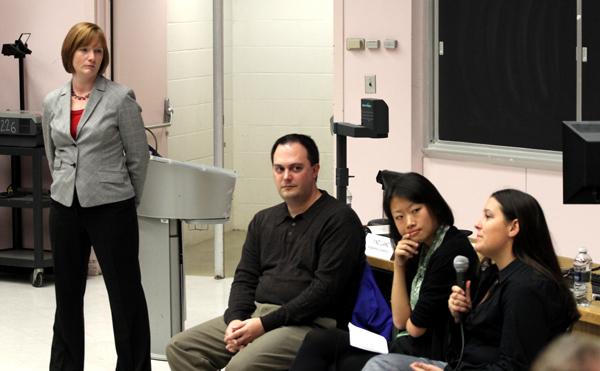
The Career Development Center (CDC) held a job panel titled “Is My Student Going to Get a Job?” from 2 to 3 p.m. Saturday in Lecture Hall 14. About a dozen guests, including students and their parents, attended to explore their job prospects in a sluggish economy.
College graduates are by no means immune to the economic downturn. Just 56 percent of the nationwide class of 2010 had jobs upon graduation, and the median starting salary for 2010 college graduates decreased by 10 percent from the 2008 median starting salary, according to a Rutgers University study cited in a report from The New York Times this year.
Holly Horn, assistant director of the CDC, hosted the job panel, which was made up of Brian Teta ‘96, a manager of the banking firm First Investors who graduated from Binghamton University, Yinzi Liang, a senior majoring in financial economics and a résumé reviewer at the CDC and Andrea Cronkrite, a graduate student in the sociology department and a resident director in Hinman College’s Roosevelt and Smith Halls.
“How to become a competitive candidate is what we’re focusing on,” Horn said. “Everyone is employable. What you need to be doing as a student is preparing yourself for life after college. What are the smart moves students should make that will help them be a competitive candidate?”
According to the panelists, getting involved on campus, developing social and leadership skills and networking are effective steps students can take to make themselves more eligible for jobs.
“While in college, I recommend looking at outlets that don’t seem 100 percent traditional,” Teta said. “Look at internships you wouldn’t have thought of ahead of time. Also, volunteer.”
Teta also stressed the importance of networking.
“Join other organizations to help you network both on and off campus,” Teta said. “Some relationships in college will last very long afterward. You never know who you’re going to meet.”
Horn emphasized that part-time jobs can also be important to gaining experience which employers desire.
“Students apologize for having a job they don’t think is important enough,” Horn said. “But you’re learning something from any one of those jobs.”
Horn cited professionalism, interpersonal skills, leadership ability and punctuality among others as important skills that students can develop through volunteer work and part-time jobs during college.
“[BU] is such a large university, we have so many ways to get involved,” Cronkrite said. “There are 200 or more SA-sponsored groups that I see the GIMs for on a weekly basis. There are so many ways to get involved and none require previous experience. Find something that interests you and go for it.”
Horn and the panelists also emphasized that students’ or graduates’ majors do not always determine whether employers will consider hiring them.
Liang said that none of the employers to whom she has applied for jobs have had any kind of major requirement.
“All the positions I’m applying for aren’t looking for a specific major,” Liang said. “It doesn’t really matter what your major is. It matters who you are and what you want to do.”
Horn also said that the modern-day colloquialism, “a master’s degree is the new bachelor’s degree,” is a myth perpetuated by graduate studies schools.
“[First Investors] has a large number of recent college graduates looking for positions,” Teta said. “What surprises me is the number of people who want to take a position with us but decide not to so they can pursue their master’s and then come back. I just offered you a position; it’s the same you’d have after having a master’s.”
Most of all, Horn and the panelists emphasized that experience is ultimately what tips employers’ scales in favor of hiring an applicant, and therefore that is what all college students should be trying to attain.


